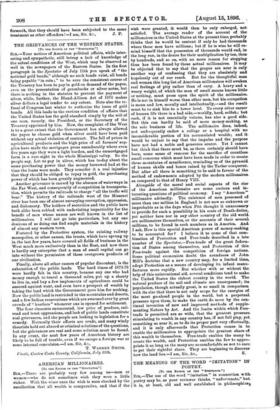AMERICAN MILLIONAIRES.
[To TEIE EDITOR OF THE "SPECTATOR."] SIR,—There are probably very few among us—men or women—who do not sometimes wish they were a little richer. With the wiser ones the wish is soon checked by the recollection that all wealth is comparative, and that if the wish were granted, it would then be only enlarged, not. satisfied. The average reader of the account of the millionaires in the United States at the present time, probably thinks that he would be content if only he had thousands where these men have millions ; but if he is wise he will re- mind himself that the possession of thousands would end, in the long run, in the desire for their multiplication by ten, then- by hundreds, and so on, with no more reason for stopping than has been found by those actual millionaires. It may be objected that to say that the grapes are sour is only- another way of confessing that they are absolutely and- hopelessly out of our reach. But for the thoughtful man and woman this long list of American millionaires will awaken real feelings of pity rather than of envy. A heavy and a weary weight, of which the man of small means knows little- or nothing, must press upon the spirit of the millionaire. He is not in himself worse than other men, but his occupation is mean and low, morally and intellectually,—and the result must be to sink him to a lower level. To every other career of human life there is a bad side,—worldly, hard, selfish; but each, if it is not essentially vicious, has also a good side. But this can hardly be said of mere money-making, as the sole business of life. The millionaire does, indeed, not unfrequently endow a college or a hospital with no inconsiderable portion of his accumulated wealth; and it. would be unjust to say that the impulse and the purpose have not had a noble and generous source. Yet I cannot. but think that there must be, as there certainly should have been, some sense of remorse for the sacrifice of countless- small concerns which must have been made in order to create these mountains of munificence, reminding us of the pyramid of human skulls and bones raised by the Tartar conqueror.. But after all there is something to be said in favour of the method of endowments adopted by the modern millionaire& as compared to that of Henry VIII.
Alongside of the moral and social aspects of the rise of the American millionaire are some curious and in- teresting questions of political economy. I say "American."' millionaire advisedly. The existence of men possessed of more than one million in England is not now so unknown or improbable as in the days when Pitt thought it unnecessary to provide for such a possibility in his scale of Death-duties,. yet neither here nor in any other country of the old world are millionaires themselves, or the accounts of their several. millions, to be found in such numbers as in America. And I ask, How is this special American power of money-making to be accounted for ? I believe it to come of that com- bination of Protection and Free-trade described in a late number of the Spectator,—Free-trade of the great federa- tion of States among themselves, and Protection of this. Free-trade against the competition of foreign nations. Some political economists doubt the soundness of John Mill's doctrine that a new country may, for a limited times adopt Protection as a means of developing its infant manu- factures more rapidly. But whether with or without the help of this unintentional aid, several conditions tend to make. the United States the richest country in the world. The natural produce of its soil and climate are unsurpassed; its population, though actually great, is so small in comparison with its size that there is not only scope for the energies of the most go-ahead people in the world, but a perpetnak pressure upon them, to make the earth do more by the con- tinual invention of new and improved methods of supple- menting Nature by Art. And the limits within which Free- trade is permitted are so wide, that the greatest pressure stimulating to wealth in any country has, if not full play, yet. something so near it, as to do its proper part very effectually, and it is only afterwards that Protection comes in to enable the millionaires to appropriate the greatest share of this wealth to themselves. Free-trade enables the many to create the wealth, and Protection enables the few to appro-. priate it so long as the many are so comfortable as not to care: to get their rightful share. They are beginning to discover
how the land lies.—I am, Sir, &e., S.


































 Previous page
Previous page